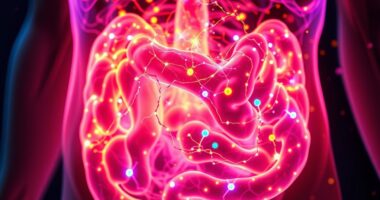Intermittent fasting influences longevity genes by activating pathways that boost cellular repair and metabolic efficiency. It stimulates proteins like sirtuins, which help repair DNA and reduce inflammation, and activates AMPK while suppressing mTOR, promoting healthier aging. These changes improve mitochondrial function and decrease age-related cellular damage. If you want to discover how these molecular shifts can support a longer, healthier life, there’s more to explore below.
Key Takeaways
- Intermittent fasting activates longevity-related genes, including sirtuins, that promote DNA repair and cellular health.
- It enhances metabolic pathways like AMPK, which boost energy efficiency and activate lifespan-extending genes.
- Fasting suppresses mTOR activity, reducing cellular growth signals linked to aging processes.
- It lowers insulin levels, supporting metabolic health and activating genes associated with longevity.
- Ongoing research shows fasting influences gene expression to delay aging and improve overall cellular function.

Intermittent fasting has gained popularity not just for its weight loss benefits but also for its potential to influence genes associated with aging and longevity. Recent studies suggest that this eating pattern activates specific genetic pathways that promote cellular health and extend lifespan. When you restrict calories during fasting periods, you trigger a biological response known as calorie restriction, which has been linked to increased lifespan in various organisms. This reduction in calorie intake doesn’t mean you starve yourself; instead, it prompts your body to adapt by shifting its metabolic focus. As a result, your cells begin to optimize their functions, engaging metabolic pathways that protect against age-related decline.
Intermittent fasting activates genetic pathways that promote cellular health and longevity.
One of the key ways intermittent fasting influences longevity genes is through its impact on metabolic pathways like AMPK and mTOR. These pathways act as molecular switches that regulate energy balance and cellular growth. When you limit your calorie intake, AMPK gets activated, signaling your cells to increase energy production efficiency and enhance repair processes. Simultaneously, fasting suppresses mTOR activity, a pathway associated with cellular growth and aging. By downregulating mTOR, your body reduces unnecessary cell proliferation, which can lead to age-related diseases like cancer. This coordinated regulation helps promote healthier aging and potentially extends your lifespan.
Furthermore, intermittent fasting stimulates the production of beneficial molecules such as sirtuins, a family of proteins that play crucial roles in DNA repair, inflammation reduction, and metabolic regulation. These proteins are often called longevity genes because they help maintain cellular integrity over time. When you fast, your body increases sirtuin activity, which in turn enhances mitochondrial function and promotes resistance to oxidative stress. This process is essential because oxidative stress contributes substantially to cellular aging. By activating these longevity genes, fasting creates a favorable environment for your cells to stay healthier longer.
Additionally, fasting influences insulin signaling pathways, which are closely tied to aging. Lower insulin levels, achieved through calorie restriction, reduce the risk of age-related metabolic diseases and support the activity of longevity-promoting genes. This not only helps maintain your metabolic health but also fosters an environment where your cells can repair damage more effectively. Understanding how bad lemon juice can spoil and how to store it properly can prevent unnecessary waste and ensure safety in your kitchen.
Frequently Asked Questions
Does Intermittent Fasting Affect Lifespan in Humans?
You might wonder if intermittent fasting can extend your lifespan. Research suggests that this dietary pattern can positively influence metabolic health, which is essential for longevity. By adopting intermittent fasting, you may improve insulin sensitivity and reduce inflammation, potentially affecting lifespan. While more studies are needed, current evidence indicates that such dietary patterns could support healthier aging and long-term health benefits, making it a promising approach for longevity.
Can Intermittent Fasting Reverse Aging Markers?
You might wonder if intermittent fasting can reverse aging markers. While it doesn’t erase aging entirely, it promotes caloric restriction that activates cellular repair processes. This enhances your body’s ability to fix damaged cells, potentially slowing aging signs. By reducing calorie intake periodically, you support your longevity genes, which may help improve overall health and keep you looking and feeling younger longer.
Are There Specific Longevity Genes Influenced by Fasting?
Imagine revealing the secrets to eternal youth! You should know that fasting influences specific longevity genes by activating genetic pathways that combat aging markers. It can dramatically slow down your body’s aging process by turning on genes linked to cellular repair and stress resistance. These powerful genetic changes may help you stay younger longer, making intermittent fasting a remarkable tool in your quest for a healthier, longer life.
What Are the Potential Risks of Intermittent Fasting?
You should consider that intermittent fasting can pose risks like nutritional deficiencies if not managed appropriately. It may also trigger disordered eating patterns, especially if you have a history of eating disorders. While fasting offers benefits, you need to stay mindful of these potential issues and consult healthcare professionals to ensure you’re practicing it safely and maintaining balanced nutrition.
How Does Fasting Compare to Other Longevity Interventions?
You might find fasting compares favorably to other longevity interventions like caloric restriction and calorie cycling because it can promote health benefits without continuous calorie reduction. Unlike strict caloric restriction, fasting offers flexibility, and it activates longevity genes similarly. While calorie cycling varies intake, fasting creates periods of complete abstinence that boost cellular repair. Overall, fasting provides a practical, impactful way to support longevity alongside other methods.
Conclusion
Think of intermittent fasting as tending a garden; with regular care, your longevity genes flourish like blooming flowers. Just like a gardener who prunes and waters wisely, you can activate these genes to boost your lifespan. Studies show that fasting triggers beneficial changes at the genetic level, much like how sunlight awakens new life. By embracing this simple habit, you’re planting seeds for a healthier, longer future—your body’s own flourishing garden.










